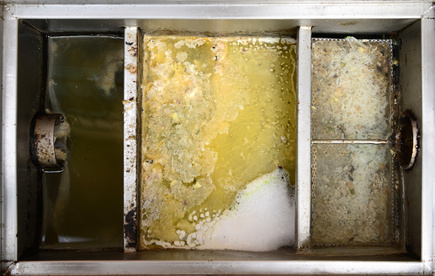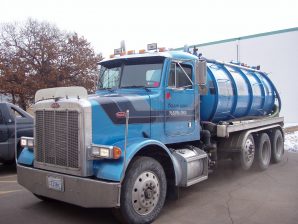
Commercial kitchens produce a large amount of grease and fats that need to be disposed of regularly to maintain functionality and environmental regulations. Restaurants use grease traps or inflammable waste traps to collect these FOG (fat, oil, grease) materials, which prevents them from congealing in pipes and causing the sewer system to overflow. The grease collected from these kinds of kitchens can be categorized into two separate types: yellow grease and brown grease.
Yellow grease is typically used cooking oil left over from deep fat fryers and industrial-sized griddles. When the fryers need to be cleaned, the used grease is emptied into metal drum containers where it cools and congeals, and can then be recycled. It is considered a “clean” type of grease because the food it comes in contact with is either fresh or frozen, so there is no chance of contamination. Recycled yellow grease is mainly used to feed livestock, but it’s also used to make soap, cosmetics, detergents, rubber, and some types of clothing. It can even be used to create biodiesel fuel! Biofuels that have been created from yellow grease burn cleaner than other types of fuel, they have a lower carbon content, and they don’t produce carbon monoxide. They can be used to generate power and heat.
Brown grease is used to describe the FOG materials that are collected in grease traps or waste traps. These receptacles are designed to catch the FOGs before they can contaminate the rest of the sewer line. Some are small enough to fit under a commercial sink, while others need to be installed underground. Because the waste traps hold everything that is washed down a commercial drain, the grease mingles with rotting food and dirty water, making it unsafe and unsanitary for recycling purposes. Brown grease is usually pumped out of the waste traps and disposed of in landfills or incinerated. In the last few years, there has been some interest in creating ways to recycle brown grease. While it will never be suitable to manufacture the same types of products as its yellow counterpart, brown grease has the potential to become a viable alternative to diesel fuel and an oil substitute for heavy fuel. Developing technology may make it possible for brown grease to be processed in a manner similar to yellow grease, making it a viable source of biofuel.
The most important thing to remember about grease, whether yellow or brown, is to keep it out of your drain as much as possible. If left untreated, grease buildup almost always leads to sewer overflow. Remember to collect it and throw it away instead of dumping it down your sink or toilet! The environment will thank you, and so will your wallet!



